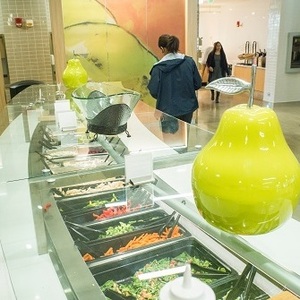Biodiesel helps UConn gain green rating at all 8 dining halls

Photo: Gail Merrill/UConn
April 20, 2017
BY Stephanie Reitz, UConn Communications
UConn has become one of a select few public universities in the U.S. to achieve green certification for every dining hall on campus, based on practices used at each site to promote environmental sustainability.
The nonprofit Green Restaurant Association recently certified all of UConn’s eight residential dining units as “Certified Green Restaurants,” a designation given to facilities that meet several standards in conserving energy and water, reducing food waste, reducing and recycling waste, and other measures.
UConn’s accomplishments include eliminating the use of Styrofoam in its facilities, operating a comprehensive recycling program, recycling grease to result in biodiesel fuel, and saving water and energy by using high-efficiency sprayers.
Advertisement
The dining department also replaced disposable utensils with reusable items, uses Energy Star-rated equipment, buys locally produced food when possible, and removed trays to cut down on washing and on the amount of food that is taken but not eaten.
“Achieving ‘Green Restaurant Certification’ for all of our eight residential dining facilities was an important goal for us,” said Dennis Pierce, UConn’s director of dining services. Sustainability is part of UConn Dining Services’ mission.”
Pierce said it is part of Dining Services’ philosophy to treat the environment as “a community to which we belong,” and to treat it with love and respect rather than as a commodity. “For these reasons,” he said, “for Dining Services, there were no choices but to achieve green certification.”
Advertisement
Students and their families can view the scores in each category for all of the dining facilities by clicking on the GRA logo next to the dining unit’s name on the Department of Dining Services’ online listing of locations.
Dining Services serves more than 180,000 meals weekly to students in the residence halls, and also operates a network of cafes and other eateries on campus.
The department has won dozens of awards over the years in several categories, including playing an important role in UConn’s consistent placement in the Top 10 of the Sierra Club’s “Cool Schools” ranking for environmentally friendly colleges and universities.
“With eight Certified Green Restaurants on campus and 500 total environmental steps taken, the University of Connecticut’s commitment to sustainability is clear,” said Michael Oshman, CEO and founder of the Green Restaurant Association. “The University of Connecticut’s dining services are leading the university food service industry to a more sustainable future.”
Related Stories
U.S. operatable biofuels capacity increased slightly in January, with gains for ethanol, according to the U.S. EIA’s Monthly Biofuels Capacity and Feedstock Update, released March 31. Feedstock consumption was down when compared to December.
U.S. farmers are expected to plant 83.5 million acres of soybeans in 2025, down 4% when compared to last year, according to the USDA National Agricultural Statistics Service’s annual Prospective Plantings report, released March 31.
ADM and Mitsubishi Corp. on March 27 announced the signing of a non-binding memorandum of understanding (MOU) to form a strategic alliance to explore potential areas of future collaboration across the agriculture value chain.
China’s exports of used cooking oil (UCO) reached a record high in 2024 but fell sharply in December after the Chinese government eliminated the 13% export tax rebate for UCO, according to a report filed with the USDA.
Ash Creek Renewables expands global reach with exclusive camelina seed licenses and 'Forks and Fuels' initiative
Ash Creek Renewables, a portfolio company of Tailwater Capital LLC, on March 20 announced it has secured exclusive licensing rights from Montana State University for a new high-performance camelina seed variety.
Upcoming Events










